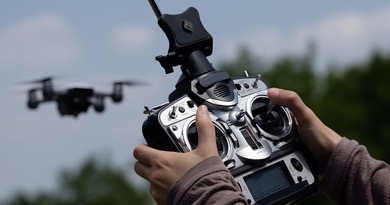Drones in Hydroplane Racing. Maybe a Career?
Both Popular and Polarizing
Seeing a drone in use often elicits both glee and chagrin. People either love their utility or are not so fond of their “intrusion.” Regardless, drones are becoming increasingly more mainstream all the time.
Drones are being used for everything from business to sport to personal recreation. Many of us have seen drones in use at Unlimited Hydroplane race sites. They provide valuable perspectives to race officials adding evidence in various types of rules infractions that boat- or land-based views just can’t deliver.
During hydroplane racing heats, the Chief Referee has access to at least one drone feed. Typically, they have one drone hovering over each of the two turns, and often at the Start/Finish.
No one can argue the value drones hold in special use cases like the sport of Unlimited Hydroplane Racing.
Are Drones For You?
If you come down on the side of “popular” in the drone discussion, you may have had fleeting visions of becoming a drone operator yourself. More to the point, you may be interested in a career change that includes piloting drones for a livin.
And it really doesn’t matter in which industry you have an interest. Drones are used by famers to monitor crop growth in an attempt to increase crop production. In construction, drones can map and survey sites much more quickly than walking the project. For years, film producers have used drones in place of expensive helicopters to get those dramatic airborne shots.
The list goes on and on. Chemical inspections, conservation analysis, and of course, public safety – all these (and many, many more!) use drones to add efficiency, effectiveness, and most importantly, safety.
Who knows? You may get to work a future Unlimited Hydroplane Race!
How to Prepare For A Career In Drones

Great for beginners
Available on Amazon
If you are interested in a career operating drones, prepare you must.
Naturally, you’ll first need a drone. Let’s get something straight right away: there is a good chance you will crash as you get familiar with controlling it. It’s a really good idea to start with an affordable model that is easy to fly.
Drones can be are expensive. Even with GPS capabilities and obstacle avoidance technology, it’s easy to wreck your drone. One issue with obstacle avoidance is the sensors are only on the front. When you are learning to fly, you can back into something fairly easily.
The Solution?
Start your drone flying career with an affordable and durable product. That’s why many people recommend starting with a quadcopter. A quadcopter is fairly forgiving as it has four rotors for stable lift. Often, the camera is only fair to good, and does not include the obstacle avoidance “intelligent flying” capabilities.
The best part is quadcopters are made to crash. (Sort of.) With their high plastic content, they have a very good chance of continued flying, even if colliding with tress, walls, or the ground. If you crash an advanced model, well… that could be much more expensive.
Once you get more familiar with flight controls and characteristics, you will be a lot safer. At that point, you’ll have a lot more money floating in the air, so your financial exposure is reduced.
Practice, Practice, Practice

One way is of course, to practice. Your first goal is of course getting the basic feel for controlling your drone. The more you fly it, the better you’ll get.
But there’s more you can do. If you really want to get precise, you can set up an obstacle course to really start to challenge your skills. There are many ways to do that, but setting up a drone obstacle course could get you there much quicker.
FAA Certification for Commercial Drone Use
So far, everything we’ve talked about is available to everyone. If you have the desire to learn how to fly a drone for your own recreation and enjoyment, you can buy one and start crashing… I mean flying it.
This is where there could be a change of focus, depending on your goals. We started this article suggesting that a future dream of yours might be to be hired to provide drone coverage for an Unlimited Hydroplane Race. If so, the Federal Aviation Administration is your next step.
There’s no need for any sort of pilot’s certification to FLY a drone, but it gets very specific on the requirements if you want to commercialize that skill. The FAA’s Part 107 Rules provide all the details for when you need to become a commercial drone pilot.
The FAA requires three specific steps:
- Step 1: Learn the Rules
- Step 2: Pass Knowledge Test
- Step 3: Register Your Drone
These requirements benefit all of us by making sure what’s in the air – stays in the air – or at least comes down in a controlled manner. Not to mention teaching and adhering to responsible operations.
Formal Drone Training
You might want to consider joining a formal training program. There are many quality organizations who focus on taking you toward a professional certification. These certifications can have specialties or be more general in nature.
One such organization that prepare you for career as a drone pilot is DWS Drone School. DWS offers both online training along with their onsite programs at their locations in and in-person program with Delaware, Georgia, and New Jersey.
Reach out to several schools to find one that fits your goals. You’ll be exposed to many vital concepts and intense training that can pay off in a rewarding career.
Drone Certification Requirements
To get your certification, you need to be 16, pass a knowledge test at an FAA-approved testing facility, and be cleared by TSA.
The hardest part here is the aeronautical knowledge test. Did you know that much of the test is the same test that real pilots take? So it’s challenging. Most people have to take it a few times before they pass. You pay the testing fee every time you take it, and you have to wait two weeks before you can take it again.
So be prepared.
You will need to find a place to practice safely. It’s vital to fly in an open area such as a field or park, with as few people around as possible. Ideally, you’l be on private property so you know there will be few people around. The last thing you need is to injure a bystander and get sued.
Finally, you should never fly your drone alone. You always need a spotter to stay safe. Note that you are required to maintain line of sight with the drone when it is flying. If you look at the video signal, you aren’t doing that. So you need a spotter.
Are Drones for You?

Available on Amazon
Wanna guess the price?
Whether you are on the side of popular or polarizing, we all have to admit drones have become quite the technology. You may have a basic interest as a hobbyist and want to get some great photography or simply enjoy the thrill of piloting (while keeping both feet on the ground.)
On the other hand, you may have a gold to becoming a commercial drone pilot. You still get the thrill of piloting a craft, but your avocation could become a vocation.
The moral to the story is that becoming a drone operator is possible for all of us. It just takes some preparation, some practice, and of course a bit of a financial investment. We’ve already learned though, there’s a smart way to go about it.
Who knows… you may get so good, and have so much business, you’ll need the top of the line equipment to satisfy that long line of clients!

Contributed by:
Sean Dorris
Leading Mobile Detailing
Sean Dorris has been detailing cars, boats, and RVs for the past ten years in the Los Angeles area and wants to share his knowledge and experience with others.
El Segundo, CA
Phone: 310.321.8639
Email: leadingdetailing@icloud.com
Website: leadingdetailing.com


